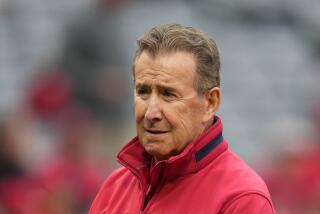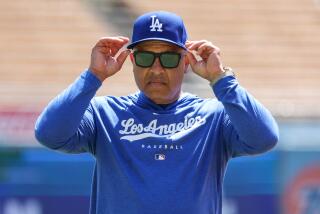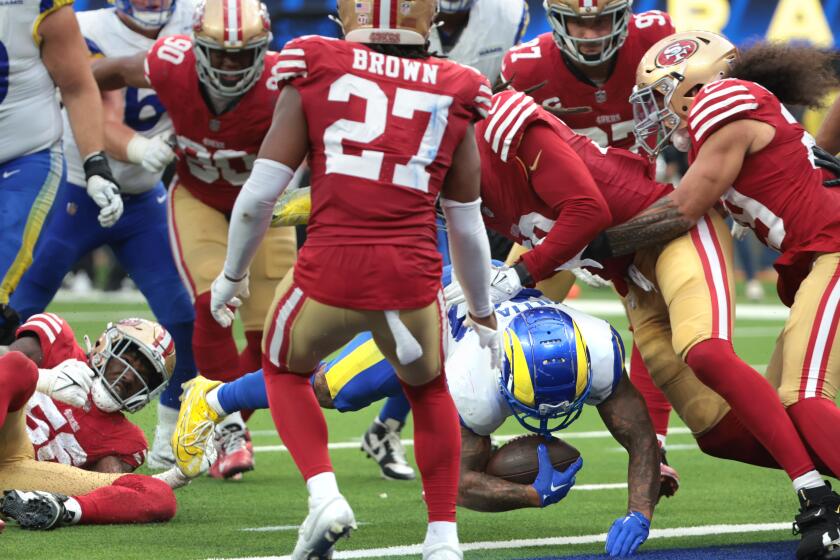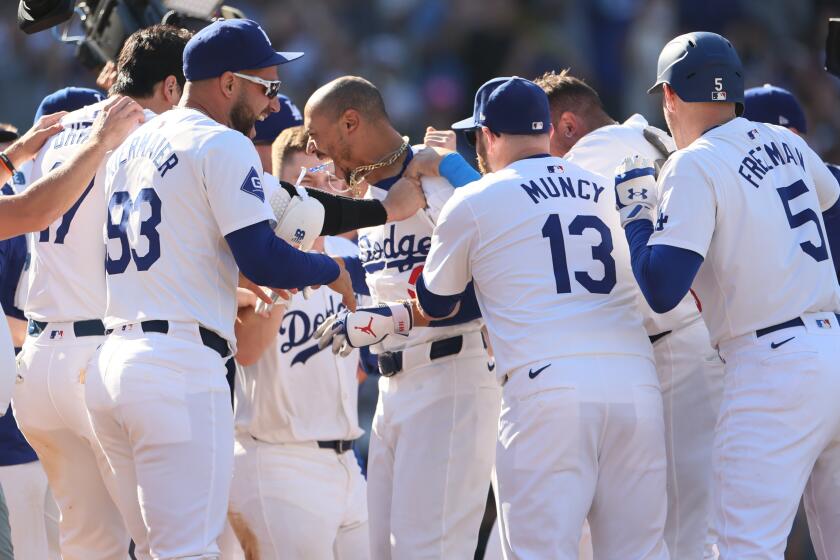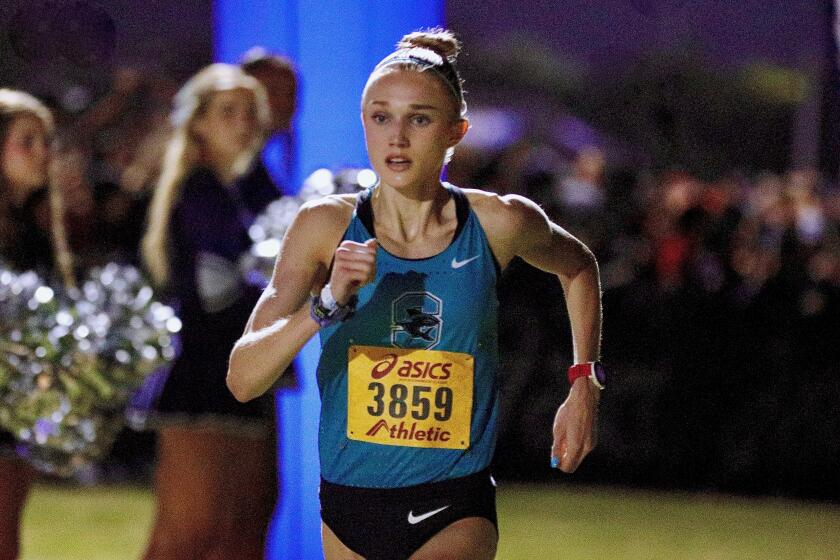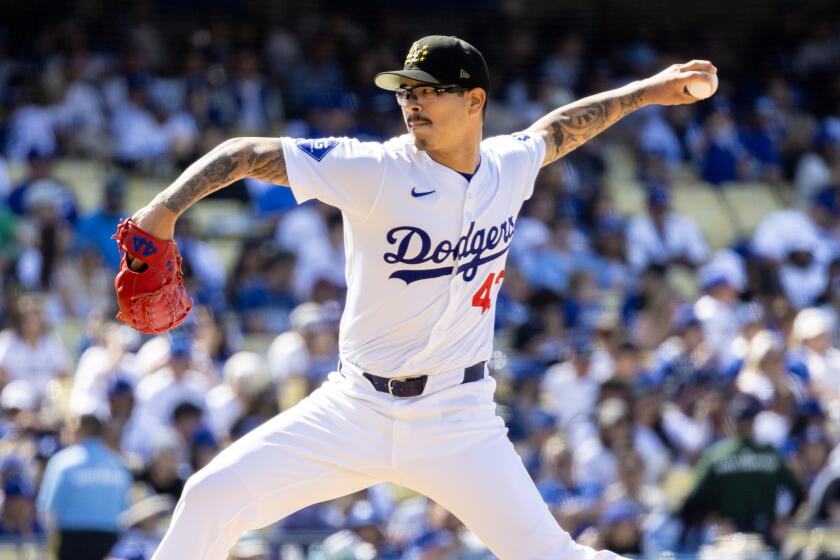Now is not the time to add the designated hitter to the National League
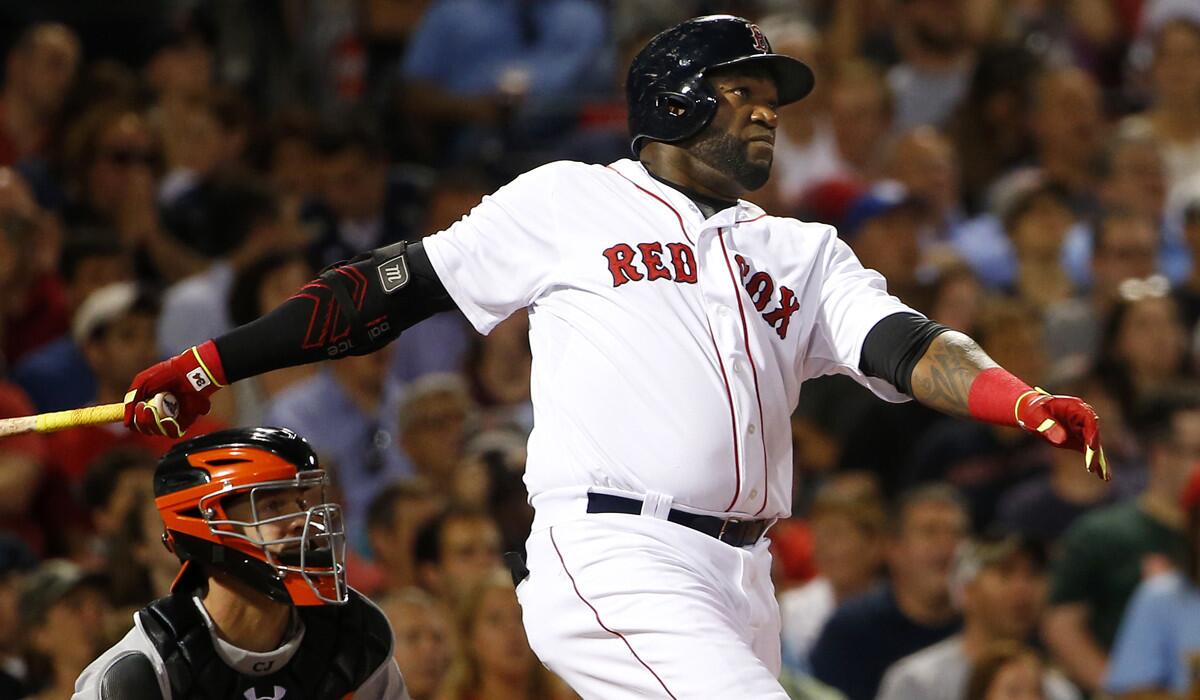
Boston Red Sox’s David Ortiz follows through on a two-run home run against the Baltimore Orioles during the sixth inning last season.
Impose the designated hitter upon the National League and, next thing you know, the Dodgers and Angels could be playing in the same division.
The DH in the NL could lead to the demise of the NL as we know it. And that’s an unnecessarily significant issue for baseball owners to consider now, as they prepare to open collective bargaining negotiations with the players’ union.
No wonder Commissioner Rob Manfred was so quick to quash talk of adding the DH to the NL — after accidentally igniting conjecture that MLB was actually considering the idea.
St. Louis Cardinals General Manager John Mozeliak got the rumor mill started by saying the idea had gained “more momentum,” and Manfred acknowledged as much when owners met last week in Florida. Among a new wave of owners, Manfred said, the thought of a DH in each league no longer was considered “some sort of heretical comment.”
Manfred then headed home to New York. By the time his flight landed, he was astonished to read — in headlines all over — that the NL was on the verge of adopting the DH.
This week, he offered a clarification. “The most likely result on the designated hitter for the foreseeable future is the status quo,” Manfred told ESPN.
What Manfred said in Florida about there being a willingness to talk about expanding the DH obscured what he said next — a more important and historically relevant point: “The biggest remnant of league identity is the difference between DH and no DH.”
Each league used to have its own league president, its own umpires, its own schedule. That last part used to make the World Series more fun. After two decades, the novelty of interleague play has long faded. The Kansas City Royals and New York Mets, combatants in the 2015 World Series, do not meet again until … well, Opening Day 2016.
If the DH comes to the NL, there would be no significant difference between the leagues, and no need for them to survive — in their current alignment, that is.
The strongest argument in favor of interleague play is that it gives fans what they want — the Dodgers play the Angels, the Mets play the New York Yankees, the San Francisco Giants play the Oakland Athletics, and so on.
When former commissioner Bud Selig needed to persuade the Houston Astros to move to the American League, he sweetened the deal by slotting the Astros in the AL West — with 19 games each year against their geographic rival, the Texas Rangers.
So, if the NL product and the AL product becomes the same, realignment would be in order, to give the fans what they want — and, of course, to give the owners the chance to make the most money out of the regular season.
Keep the best of the current rivalries — the Dodgers against the Giants, the Chicago Cubs against the Cardinals, the Yankees against the Boston Red Sox. Then scramble the divisions so that the California teams all play in the same division, so that the Royals and Cardinals play as often as the Astros and Rangers, so that Toronto and Montreal battle for Canadian supremacy within the same division.
That’s right, Montreal. Taking the DH to the NL is likely to take a few years anyway. By that time, there could be a couple of teams on the move.
The Tampa Bay Rays have permission to look outside their current St. Petersburg home for a new ballpark in the Tampa Bay area. The A’s might get the Oakland Coliseum site to themselves — their preferred location for a new ballpark — but the Raiders are expected to play at least one more season there before deciding whether to leave town.
Manfred told The Times last year that the best available North American markets for baseball probably are not in the United States. That likely means one team in Montreal and another somewhere in Mexico — maybe the Rays, maybe the A’s, maybe expansion. Nothing spurs geographical realignment quite like crossing international borders.
And, a few years down the road, the continued evolution of the DH role — and of the game itself — could ease fears among owners that adding the DH to the NL would drive up the bidding for high-salaried sluggers.
The Astros cut Chris Carter, who averaged 30 home runs and 182 strikeouts the last three years. The Pittsburgh Pirates did the same with Pedro Alvarez, who averaged 28 home runs and 153 strikeouts the last four years. Alvarez remains unsigned, as does Ian Desmond, who averaged 22 home runs — as a shortstop! — and 157 strikeouts the last four years.
On an analytical front, teams are confronted with mounting evidence that fat contracts that carry one-dimensional players into their late 30s seldom pay off, and not just because of bans on amphetamines and steroids. On a strategic front, teams increasingly use the DH to nurse players back from injury, and to give players a “half-day off” by keeping them out of the field for a game.
There is one player who had enough at-bats as a DH to qualify for the batting title in each of the last two seasons. His name is David Ortiz, and he is retiring this fall.
So beware the conventional wisdom that the players’ union would be thrilled with an NL DH because of the addition of high-paid jobs. If the owners want to add the DH to the NL, the union probably would ask for an additional roster spot, or two, on each team.
That would be the logical time for the NL to import the DH — not in the round of collective bargaining this year, but in the next one, four or five years from now, in concert with relocation and/or expansion outside the United States and the accompanying geographical realignment.
Or, you know, they could leave well enough alone. Let us enjoy watching Zack Greinke and Bartolo Colon at bat, and the second-guessing and double-switching, and the arguing about whether pitchers should bat at all.
Twitter: @BillShaikin
More to Read
Go beyond the scoreboard
Get the latest on L.A.'s teams in the daily Sports Report newsletter.
You may occasionally receive promotional content from the Los Angeles Times.

